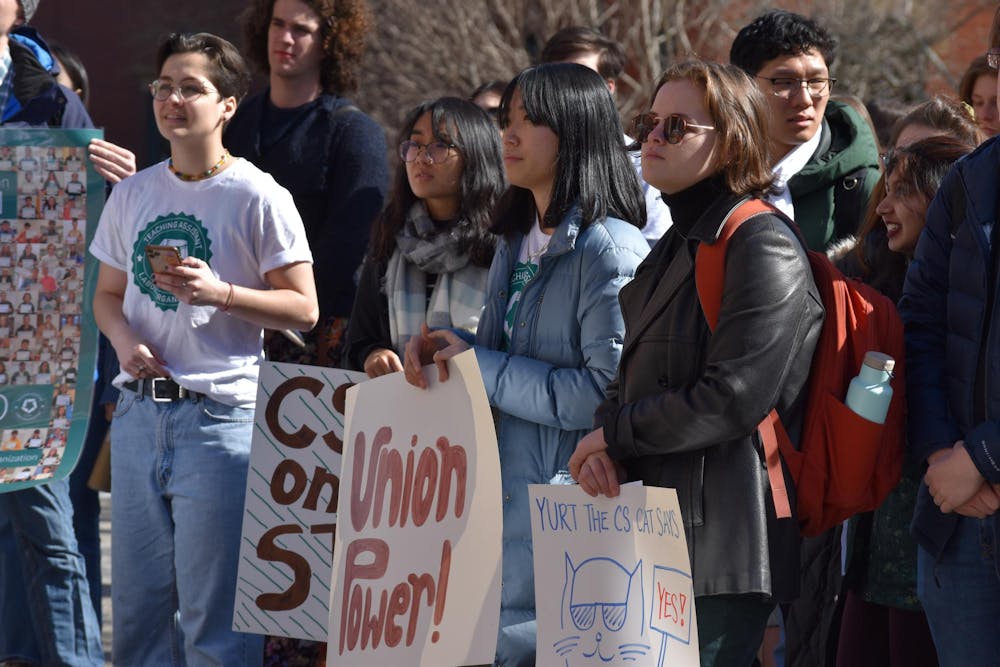When Brown reached a three-year contract with Teaching Assistant Labor Organization in late October, the union’s members became the first undergraduate student workers to secure a long term contract with the University.
The contract included a 3% annual increase in the base hourly rate for all undergraduate teaching assistants in the Computer Science department, and adopted new procedures for addressing allegations of discrimination and harassment. It also overhauled guidelines surrounding course development, incorporating feedback from computer science faculty and TAs.
The contract, which was ratified by 94% of voting CS TAs, replaced a one-year interim agreement in place for the 2023-24 academic year.
In interviews with The Herald, TALO and University representatives characterized the year covered by interim agreement as a trial period. It laid the groundwork for the latest contract and allowed negotiators to focus on a handful of key articles during the most recent round of bargaining, TALO Organizer Connor Flick ’26 said.
Feedback from faculty and TAs, the two parties said, informed the long-term agreement negotiated over the past year.
“I think we were all new to this,” Deputy Provost Janet Blume said of the trial period. Blume led the University’s bargaining team during both rounds of negotiations with TALO. “We knew that at least we had the luxury in an interim contract to try things a little bit and hope that they would work for the student employees, for the faculty, for the staff and for the computer science students,” she said.
Feedback from faculty and TAs resulted in revisions to what constitutes “extensive course development,” which includes creating new or modifying existing assignments. New guidelines also outline the timeline that professors and TAs must follow for course development work.
“The language in the previous interim contract discouraged course development work,” Associate Chair of Computer Science Jeff Huang, who represented the department during negotiations, wrote in an email to The Herald.
“Upon reflection after the interim period, both TALO and the faculty agreed that this is a rewarding aspect of the job,” Huang added. The three-year contract “strikes out the discouraging language” and lifted restrictions on what constitutes “extensive development,” he added.
Adopting language from the Graduate Labor Organization’s current contract, TALO’s contract also allows CS TAs to enter a formal grievance process for complaints of alleged discrimination and harassment. Complaints that are not resolved early in the grievance process can move to third-party arbitration, a new avenue for addressing disputes that was not previously available to TAs.
Prior to the new agreement, such complaints were instead “processed through the procedures of the University Office that handles such discrimination claims,” according to the interim agreement.
The change reflected the University’s desire to “harmonize language across contracts,” said Benjamin Trachman, Brown’s assistant director of labor relations. “We don’t want to have a completely different process for the computer science undergraduates, as we do with the GLO students, as we do with those who are our community coordinators.”
In an interview with The Herald, TALO President Yasmine Abdelaziz ’25 said that the formal grievance process offered GLO members additional legal avenues to address allegations of harassment and discrimination.
“It’s not just aligning contracts for the sake of aligning contracts,” Abdelaziz said. “We think that when a student files a grievance against their employer, it’s very different than a student going to a Brown office trying to prosecute Brown for doing something wrong.”
The bargaining processes for both the interim agreement and long-term contract stands in contrast to the ongoing negotiations for the two other undergraduate labor unions on campus: the Labor Organization of Community Coordinators, and the Third World Labor Organization, which represents student workers at the Brown Center for Students of Color.
In an Instagram post in early December, LOCC organizers wrote that the union had requested the involvement of a federal mediator in negotiations with the University. Nearly a year after unionizing, community coordinators went on strike for three days in August during first-year move-in, citing deadlocked negotiations.
Nearly a year after unionizing, TWLO organizers also remain in contract negotiations. In September, TWLO spokesperson Jo Ouyang ’26 told The Herald the union believed administrators were deliberately delaying contract negotiations to avoid reaching an agreement.
In an email to The Herald, University Spokesperson Brian Clark wrote that “the claim that the University is seeking to delay bargaining is unfounded.”
Ethan Schenker is a university news editor covering staff and student labor. He is from Bethesda, MD, and plans to study International and Public Affairs and Economics. In his free time, he enjoys playing piano and clicking on New York Times notifications.





